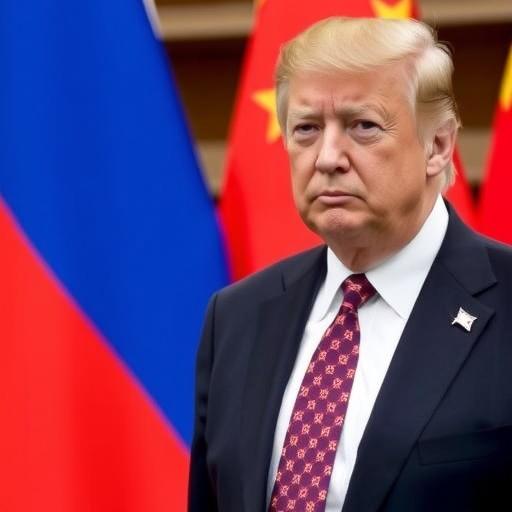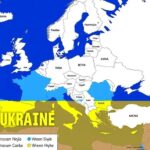Trump Seeks China’s Help to End Russia-Ukraine War Ahead of High-Stakes Xi Jinping Summit
In a bold diplomatic move that could reshape global alliances, President Donald Trump has publicly called on China to play a pivotal role in ending the protracted Russia-Ukraine war, just as he launches a five-day Asia tour culminating in critical talks with President Xi Jinping. Speaking to reporters at Joint Base Andrews before boarding Air Force One, Trump emphasized that Beijing’s influence over Moscow makes it an indispensable partner in peace negotiations, setting the stage for what analysts describe as one of the most consequential U.S.-China summits in years.
The announcement comes amid escalating tensions in Eastern Europe, where the Russia-Ukraine war, now in its third year, has claimed over 500,000 lives and displaced millions, according to United Nations estimates. Trump’s outreach to China marks a strategic pivot in U.S. diplomacy, aiming to leverage Beijing’s economic leverage over Russia—China remains Moscow’s largest trading partner, with bilateral trade reaching $240 billion in 2023—to pressure for a ceasefire. “China has the power to bring this senseless conflict to an end,” Trump stated, his words echoing across international headlines and sparking debates on the future of multilateral peace efforts.
Trump’s Asia Tour Ignites Hopes for Diplomatic Breakthrough
President Trump’s five-day Asia itinerary, which began on Monday, is not just a routine state visit but a high-wire act in international relations. Kicking off in Tokyo for bilateral talks with Japanese Prime Minister Fumio Kishida, the tour will weave through Seoul for discussions with South Korean President Yoon Suk Yeol before reaching Beijing on Thursday for the marquee summit with Xi Jinping. White House officials have confirmed that the Russia-Ukraine war will dominate the agenda in China, with Trump reportedly preparing a series of incentives, including eased trade restrictions, to encourage Beijing’s cooperation.
Diplomatic insiders reveal that preparations for the Xi meeting have been intense, involving months of backchannel communications. A senior U.S. official, speaking on condition of anonymity, told reporters that Trump views China as a “key mediator” capable of swaying Russian President Vladimir Putin, given the deep ties forged since the war’s onset in February 2022. China’s neutral stance—abstaining from UN votes condemning Russia while providing economic lifelines—has long frustrated Western allies, but Trump appears willing to engage pragmatically. “We’re not here to lecture; we’re here to deal,” the official quoted Trump as saying during internal briefings.
The tour’s timing is no coincidence. With midterm elections looming in the U.S. and global energy prices still volatile due to the war—European natural gas prices have surged 40% this year alone—Trump is under domestic pressure to deliver foreign policy wins. His approach contrasts with the Biden administration’s more confrontational rhetoric toward China, signaling a potential thaw in U.S.-China relations amid shared interests in global stability.
China’s Balancing Act in the Russia-Ukraine War Exposed
Beijing’s position on the Russia-Ukraine war has been a masterclass in strategic ambiguity, and Trump’s overture could force China to tip its hand. Since the invasion, China has refrained from direct military aid to Russia but has ramped up purchases of discounted Russian oil and gas, helping Moscow evade Western sanctions. In 2023, China-Russia trade hit record highs, with energy imports alone accounting for $100 billion, per Chinese customs data. This economic lifeline has sustained Russia’s war machine, drawing sharp criticism from NATO members.
Yet, President Xi Jinping has also positioned China as a peacemaker. In a landmark 12-point peace plan unveiled in February 2023, Beijing called for de-escalation and respect for territorial integrity—language that subtly nods to Ukraine without alienating Russia. Xi’s recent phone call with Ukrainian President Volodymyr Zelenskyy in April underscored this duality, where he expressed willingness to facilitate dialogue. Analysts believe Trump’s summit could build on this, potentially leading to China hosting trilateral talks involving U.S., Russian, and Ukrainian representatives.
Domestic factors in China add layers to the equation. With its economy grappling with a property crisis and youth unemployment at 15%, Xi may see value in burnishing China’s global image as a responsible power. State media has already amplified Trump’s comments, with Xinhua News Agency framing the U.S. request as an acknowledgment of China’s rising influence. However, hardliners in Beijing worry that siding too closely with Washington could strain the “no-limits” partnership with Russia, declared just days before the 2022 invasion.
Historical Echoes: U.S.-China Diplomacy on Global Conflicts
Trump’s bid to enlist China in resolving the Russia-Ukraine war draws on a rich history of U.S.-China collaboration in crisis management, even as rivalry defines their relationship. During the 2014-2015 Ebola outbreak, joint U.S.-China efforts delivered aid to West Africa, showcasing unexpected synergy. More relevantly, in the Korean War armistice of 1953, China mediated between the U.S. and North Korea, a precedent Trump aides are invoking to highlight Beijing’s diplomatic heft.
Under Trump’s first term, U.S.-China diplomacy was dominated by trade wars, but moments of alignment emerged. In 2018, both nations cooperated on North Korea’s denuclearization talks, with Xi hosting Kim Jong Un in Beijing to pave the way for Trump’s Singapore summit. Fast-forward to the Russia-Ukraine war: Initial U.S. sanctions on Russia prompted China to diversify away from the dollar, but recent overtures from Secretary of State Antony Blinken in June 2023 hinted at thawing ties. Blinken, during a Beijing visit, urged China to use its leverage over Russia, a message Trump is now amplifying.
Quotes from past interactions underscore the potential. Xi, in a 2017 speech alongside Trump, declared, “China and the United States have the ability to cooperate on major international issues.” Trump, ever the dealmaker, replied at the time, “We have a great relationship, and it will only get better.” Whether this optimism translates to the current crisis remains to be seen, but the stakes are immense: A breakthrough could stabilize global food supplies, as Ukraine’s grain exports—disrupted by the war—feed 400 million people worldwide, according to the World Food Programme.
Expert Voices: Weighing the Odds of a China-Brokered Peace
International relations experts are divided on whether Trump’s diplomacy with Xi Jinping can yield results in ending the Russia-Ukraine war. Dr. Yun Sun, director of the China Program at the Stimson Center, argues that Beijing has little incentive to alienate Russia but could be swayed by U.S. concessions on tech exports. “China wants to be seen as a global leader, not a veto player,” Sun said in an interview. “If Trump offers tangible benefits, like relaxing Huawei restrictions, Xi might nudge Putin toward the table.”
Conversely, John Mearsheimer, a University of Chicago professor known for his realist views, warns that China’s alignment with Russia is ideological. “Beijing sees the U.S. as the aggressor in this proxy war,” Mearsheimer noted. “Trump’s charm offensive might backfire, pushing China closer to Moscow.” Statistics bolster this caution: Russia’s military spending has doubled since 2022, partly funded by Chinese loans estimated at $80 billion.
Optimists point to recent polls. A Pew Research Center survey from May 2024 found 62% of Chinese respondents favor mediation in Ukraine, up from 45% in 2022. European diplomats, too, are watching closely; EU foreign policy chief Josep Borrell tweeted, “Any effort to end the war is welcome, including from China.” As Trump prepares for Beijing, think tanks like the Brookings Institution predict a 40% chance of a joint U.S.-China statement on de-escalation, contingent on summit outcomes.
Broader implications ripple through Asia. Allies like Japan and South Korea, wary of China’s assertiveness in the South China Sea, urge Trump to link Ukraine aid to regional security pacts. During Tokyo stop, Japanese officials reportedly pressed for a unified front, with Kishida stating, “Peace in Europe secures peace in Asia.”
Global Ripples: What a U.S.-China Deal Could Mean for the Future
If Trump’s summit with Xi Jinping bears fruit, the fallout from the Russia-Ukraine war could shift dramatically, offering a blueprint for future diplomacy. A China-mediated ceasefire might involve territorial compromises—such as freezing frontlines in Donbas—while addressing NATO expansion concerns that fueled the conflict. Economically, it could slash global inflation; the war has added 1.5% to worldwide CPI since 2022, per IMF data.
For U.S. foreign policy, success would validate Trump’s transactional style, bolstering his re-election bid. Failure, however, risks portraying America as overly reliant on a strategic rival, potentially eroding alliances. China stands to gain prestige, positioning itself as an alternative to U.S.-led order; Xi has already touted the Belt and Road Initiative as a peace enabler, with 150 countries enrolled.
Looking ahead, the summit could spawn follow-up mechanisms, like a U.S.-China-Russia trilateral forum. Ukrainian officials, while skeptical, express guarded optimism. Zelenskyy, in a recent CNN interview, said, “We welcome any pressure on Putin, even from China.” As Trump touches down in Asia, the world watches: Will this be the diplomatic masterstroke that ends Europe’s bloodiest conflict since World War II, or another chapter in great-power maneuvering? The answers may emerge from Beijing’s halls by week’s end, with implications echoing far beyond the Russia-Ukraine war.








